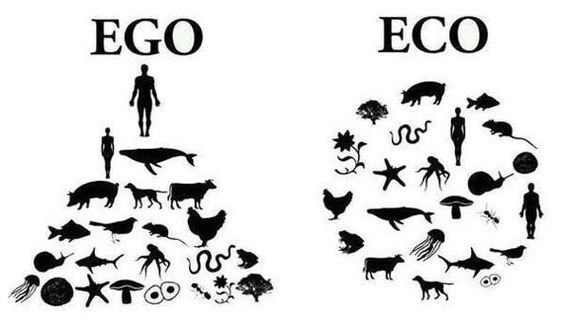From Ego-System to Ecosystem: Reinstating the Golden Rule of Community
No matter what your cultural origins, you probably grew up hearing the importance of doing unto others as you would have them do unto you, a truism commonly known as the Golden Rule. Away from the adults, you might have heard another interpretation: he who has the gold, makes the rules. Although everyone aspires to the high-minded definition, what we often experience is a world in which altruism is seen as a weakness and material success celebrated as the only worthwhile investment of our time and energy.
One way to look at the results of these differing interpretations is to describe the outcomes as an ego-system versus an ecosystem:
An ego-system is structured to satisfy shareholder wants and to privatize decision-making. Financial capital is valued above other contributions, costs are not fully disclosed and transactions lack transparency.
In the ecosystem, all stakeholders are committed to the shared wellbeing of the community. All forms of capital are valued, all costs are considered and transactions are transparent.
So, how can you move a community from an ego-system to an ecosystem?
As Otto Scharmer states in his article From Ego-system to EcoSystem Economies “What’s really needed is a deeper shift in consciousness so that we begin to care and act, not just for ourselves and other stakeholders but in the interests of the entire ecosystem in which economic activities take place.”
In other words, we need to objectively assess the state of our community and make the commitment to change the system with an eye to the next generations. David Armistead, principal of Thriving Community Solutions, has developed a 7-point list of the characteristics of a well-rooted community ecosystem:
The Seven Principles of a Rooted Community Ecosystem
The requirements to realize the community purpose in an ongoing (sustainable) fashion are:
- Community Social Contract– the social network among the participants in the community must continually self-organize up from a shared commitment, held by each participant, to coordinate their living together to produce community thriving. This is the principle of Community Social Contract.
- Integral Community– The community must be thought of by its participants as a complex adaptive system within itself, and as an element of the locally and globally interconnected ecosystem.
- Full Spectrum Capital– All basic capital forms (such as materials, energy, finance, labor, social capital and knowledge) must be fully considered in all community development activity.
- Community Wealth– The aggregate working capital stock, committed to provisioning the community to thrive both now and in the future, is the wealth of the community.
- Local Recirculation (i.e. Metabolic or Circular Economy)– This working capital needed within the local network of commerce for community thriving must be maintained in a working status.
- Local Co-Reliance– Community thriving must be produced primarily through the participants’ local coordination of their personal actions for effectively living life through locally emergent network of commerce that enables the community to progressively provision itself with the primary factors of living such as water, food, shelter, power, communications, education, and health.
- Eco-Balance– The eco-footprint required for the community to thrive must be balanced against the reproductive capacity of the local ecology. Failure to maintain this balance will break the recirculation of the natural capital of the community.
In sum, in order to create long term community wealth, we need to acknowledge the complexity of our communities, commit to our shared values and create the inclusive platforms upon which generational solutions can root and thrive.

